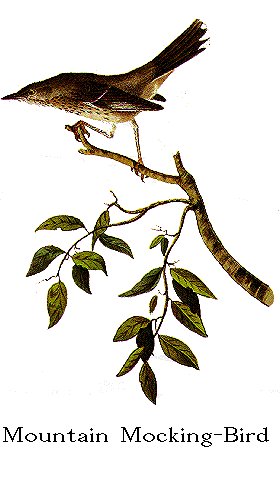
| Family XII. TURDINAE. THRUSHES. GENUS II. ORPHEUS, Swains. MOCKING-BIRD. |
Next >> |

Family |
MOUNTAIN MOCKING-BIRD. [Sage Thrasher.] |
| Genus | ORPHEUS MONTANUS, Towns. [Oreoscoptes montanus.] |
This interesting and hitherto unfigured species
was procured on the Rocky Mountains by Mr. TOWNSEND, who forwarded a single specimen
to Philadelphia, where I made a drawing of it. The following notice by Mr. NUTTALL
shews that it is nearly allied in its habits to the Mocking-bird:--
"On the arid plains of the central table-land, betwixt the northern sources
of the Platte and the Colorado of the West, in the month of June, we frequently
heard the cheering song of this delightful species, whose notes considerably
resemble those of the Brown Thrush, with some of the imitative powers of the
Mocking-bird. For a great part of the day, and especially early and late, its
song resounds through the desert plains, as it warbles to its mate from some
tall weed or bush of wormwood, and continues with little interruption nearly for
an hour at a time. We met with it in the plains exclusively, till our arrival
at Wallah Wallah, but we are not certain of having seen it in any part of
California, it being apparently entirely confined to the cooler and open regions
of the Rocky Mountains. Just before arriving at Sandy-Creek of the Colorado,
while resting for refreshment at noon, I had the good fortune to find the nest
in a wormwood bush, on the margin of a ravine, from whence the male was singing
with its usual energy. It contained four almost emerald green eggs, spotted
with dark olive of two shades, more numerous towards the greater end, the spots
large and roundish. The nest itself was made of small twigs and rough stalks,
lined with stripes of bark and bison wool. The female flew off to a little
distance, and looked on her unwelcome and unexpected visiter, without uttering
either call or complaint."
ORPHEUS MONTANUS, Mountain Mocking-bird, Towns., Journ. Acad. Nat. Sc.
Philadelphia, vol. vii. p. 192.
MOUNTAIN MOCKING-BIRD, Turdus montanus, Aud. Orn. Biog., vol. iv. p. 487.
Bill of moderate length, rather slender, compressed, straightish, pointed;
upper mandible with the dorsal line slightly declinato-arcuate, the sides convex
toward the end, the edges sharp, with a slight sinus-close to the narrow
declinate tip; lower mandible with the angle short and narrow, the dorsal line
straight, the edges sharp and a little declinate at the end, the tip narrow; the
gape-line very slightly arched.
Head oblong, of ordinary size; neck rather short, but somewhat slender.
Feet longish, rather strong; tarsus compressed, anteriorly covered with seven
large scutella, sharp-edged behind; toes of moderate length, slender, the hind
toe stout, the lateral nearly equal, the anterior united for a short space at
the base. Claws slender, arched, compressed, acute.
Plumage soft and blended. Wings of moderate length, rounded, the first
quill short, the third and fourth longest, the second and fifth equal, and about
a quarter of an inch shorter than the fourth. Tall long, rounded, of twelve
rather narrow rounded feathers.
Bill dark brown, the base of the lower mandible paler. Feet
yellowish-brown, claws dusky. The general colour of the upper parts is
greyish-brown, the tips of the secondary coverts, the edges of the primary
quills, and a large spot at the end of the three lateral tail-feathers, white;
the lower parts whitish, marked with triangular dusky spots, of which there is a
distinct line from the base of the bill; the throat, the middle of the breast,
the abdomen, and lower tail-coverts unspotted.
Length to end of tail 8 inches, to end of wings 5 3/4; wing from flexure
3 9/12; tail 3 1/2; bill along the ridge (7 1/2)/12; tarsus 1 2/12; hind toe
4/12, its claw 4/12; middle toe 8/12, its claw (3 1/4)/12.
| Next >> |